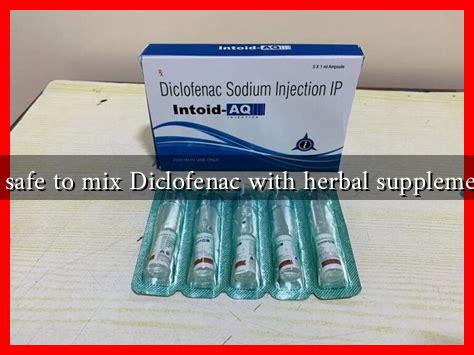-
Table of Contents
Is it Safe to Mix Diclofenac with Herbal Supplements?
Diclofenac is a widely used non-steroidal anti-inflammatory drug (NSAID) that helps alleviate pain and reduce inflammation. It is commonly prescribed for conditions such as arthritis, muscle pain, and post-operative discomfort. On the other hand, herbal supplements have gained popularity for their perceived health benefits, often used to manage pain, inflammation, and other ailments. However, the combination of these two can raise questions about safety and efficacy. This article explores the potential risks and benefits of mixing diclofenac with herbal supplements.
Understanding Diclofenac
Diclofenac works by inhibiting enzymes involved in the inflammatory process, thereby reducing pain and swelling. It is available in various forms, including tablets, topical gels, and injections. While effective, diclofenac is not without side effects, which can include:
- Gastrointestinal issues (e.g., ulcers, bleeding)
- Cardiovascular risks (e.g., heart attack, stroke)
- Kidney damage
- Allergic reactions
Given these potential side effects, patients often seek alternative or complementary therapies, such as herbal supplements, to enhance their treatment regimen.
The Rise of Herbal Supplements
Herbal supplements are derived from plants and are often used for their therapeutic properties. Some popular herbal supplements that are commonly used for pain relief and inflammation include:
- Turmeric: Contains curcumin, known for its anti-inflammatory properties.
- Ginger: Often used to alleviate pain and reduce inflammation.
- Willow Bark: Contains salicin, which is similar to aspirin and may help with pain relief.
- Devil’s Claw: Traditionally used for arthritis and muscle pain.
While these supplements can offer benefits, their interaction with pharmaceuticals like diclofenac is not well understood.
Potential Risks of Mixing Diclofenac with Herbal Supplements
Combining diclofenac with herbal supplements can pose several risks, primarily due to the lack of regulation in the herbal supplement industry. Here are some potential concerns:
- Increased Risk of Side Effects: Some herbal supplements can exacerbate the side effects of diclofenac. For example, both turmeric and ginger can have blood-thinning effects, which may increase the risk of gastrointestinal bleeding when taken with diclofenac.
- Unpredictable Interactions: The active compounds in herbal supplements may interact with diclofenac in unpredictable ways, potentially altering its effectiveness or increasing toxicity.
- Lack of Research: There is limited clinical research on the safety of combining diclofenac with specific herbal supplements, making it difficult to provide definitive guidance.
Case Studies and Research Findings
A few studies have explored the interactions between NSAIDs and herbal supplements. For instance, a study published in the Journal of Ethnopharmacology found that certain herbal extracts could enhance the anti-inflammatory effects of NSAIDs, but they also noted the potential for increased side effects. Another case report highlighted a patient who experienced severe gastrointestinal bleeding after combining diclofenac with high doses of ginger.
Consulting Healthcare Professionals
Given the potential risks, it is crucial for individuals considering the combination of diclofenac and herbal supplements to consult healthcare professionals. A doctor or pharmacist can provide personalized advice based on medical history, current medications, and specific health conditions.
Conclusion
While herbal supplements can offer complementary benefits to conventional medications like diclofenac, caution is warranted. The potential for adverse interactions and side effects necessitates a careful approach. Patients should prioritize open communication with their healthcare providers to ensure safe and effective treatment plans. Ultimately, understanding the risks and benefits of mixing diclofenac with herbal supplements is essential for making informed health decisions.

